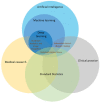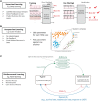Deep learning for cardiovascular medicine: a practical primer
- PMID: 30815669
- PMCID: PMC6600129
- DOI: 10.1093/eurheartj/ehz056
Deep learning for cardiovascular medicine: a practical primer
Abstract
Deep learning (DL) is a branch of machine learning (ML) showing increasing promise in medicine, to assist in data classification, novel disease phenotyping and complex decision making. Deep learning is a form of ML typically implemented via multi-layered neural networks. Deep learning has accelerated by recent advances in computer hardware and algorithms and is increasingly applied in e-commerce, finance, and voice and image recognition to learn and classify complex datasets. The current medical literature shows both strengths and limitations of DL. Strengths of DL include its ability to automate medical image interpretation, enhance clinical decision-making, identify novel phenotypes, and select better treatment pathways in complex diseases. Deep learning may be well-suited to cardiovascular medicine in which haemodynamic and electrophysiological indices are increasingly captured on a continuous basis by wearable devices as well as image segmentation in cardiac imaging. However, DL also has significant weaknesses including difficulties in interpreting its models (the 'black-box' criticism), its need for extensive adjudicated ('labelled') data in training, lack of standardization in design, lack of data-efficiency in training, limited applicability to clinical trials, and other factors. Thus, the optimal clinical application of DL requires careful formulation of solvable problems, selection of most appropriate DL algorithms and data, and balanced interpretation of results. This review synthesizes the current state of DL for cardiovascular clinicians and investigators, and provides technical context to appreciate the promise, pitfalls, near-term challenges, and opportunities for this exciting new area.
Keywords: Artificial intelligence; Big data; Cardiovascular medicine; Deep learning; Precision medicine.
Published on behalf of the European Society of Cardiology. All rights reserved. © The Author(s) 2019. For permissions, please email: journals.permissions@oup.com.
Figures







Similar articles
-
Applications of and issues with machine learning in medicine: Bridging the gap with explainable AI.Biosci Trends. 2025 Jan 14;18(6):497-504. doi: 10.5582/bst.2024.01342. Epub 2024 Dec 8. Biosci Trends. 2025. PMID: 39647859 Review.
-
AI applications to medical images: From machine learning to deep learning.Phys Med. 2021 Mar;83:9-24. doi: 10.1016/j.ejmp.2021.02.006. Epub 2021 Mar 1. Phys Med. 2021. PMID: 33662856 Review.
-
Machine Meets Biology: a Primer on Artificial Intelligence in Cardiology and Cardiac Imaging.Curr Cardiol Rep. 2018 Oct 18;20(12):139. doi: 10.1007/s11886-018-1074-8. Curr Cardiol Rep. 2018. PMID: 30334108 Review.
-
Artificial Intelligence in Precision Cardiovascular Medicine.J Am Coll Cardiol. 2017 May 30;69(21):2657-2664. doi: 10.1016/j.jacc.2017.03.571. J Am Coll Cardiol. 2017. PMID: 28545640 Review.
-
Artificial intelligence in medical imaging of the liver.World J Gastroenterol. 2019 Feb 14;25(6):672-682. doi: 10.3748/wjg.v25.i6.672. World J Gastroenterol. 2019. PMID: 30783371 Free PMC article. Review.
Cited by
-
Smart Wearables for Cardiac Monitoring-Real-World Use beyond Atrial Fibrillation.Sensors (Basel). 2021 Apr 5;21(7):2539. doi: 10.3390/s21072539. Sensors (Basel). 2021. PMID: 33916371 Free PMC article. Review.
-
Optical Mapping-Validated Machine Learning Improves Atrial Fibrillation Driver Detection by Multi-Electrode Mapping.Circ Arrhythm Electrophysiol. 2020 Oct;13(10):e008249. doi: 10.1161/CIRCEP.119.008249. Epub 2020 Sep 13. Circ Arrhythm Electrophysiol. 2020. PMID: 32921129 Free PMC article.
-
Cardiovascular Disease Prediction by Machine Learning Algorithms Based on Cytokines in Kazakhs of China.Clin Epidemiol. 2021 Jun 9;13:417-428. doi: 10.2147/CLEP.S313343. eCollection 2021. Clin Epidemiol. 2021. PMID: 34135637 Free PMC article.
-
Application of preoperative artificial neural network based on blood biomarkers and clinicopathological parameters for predicting long-term survival of patients with gastric cancer.World J Gastroenterol. 2019 Nov 21;25(43):6451-6464. doi: 10.3748/wjg.v25.i43.6451. World J Gastroenterol. 2019. PMID: 31798281 Free PMC article.
-
Practical Implementation of Artificial Intelligence-Based Deep Learning and Cloud Computing on the Application of Traditional Medicine and Western Medicine in the Diagnosis and Treatment of Rheumatoid Arthritis.Front Pharmacol. 2021 Dec 23;12:765435. doi: 10.3389/fphar.2021.765435. eCollection 2021. Front Pharmacol. 2021. PMID: 35002704 Free PMC article. Review.
References
-
- Ponikowski P, Voors AA, Anker SD, Bueno H, Cleland JG, Coats AJ, Falk V, Gonzalez-Juanatey JR, Harjola VP, Jankowska EA, Jessup M, Linde C, Nihoyannopoulos P, Parissis JT, Pieske B, Riley JP, Rosano GM, Ruilope LM, Ruschitzka F, Rutten FH, van der Meer P.. 2016 ESC Guidelines for the diagnosis and treatment of acute and chronic heart failure: the task force for the diagnosis and treatment of acute and chronic heart failure of the European Society of Cardiology (ESC). Developed with the special contribution of the Heart Failure Association (HFA) of the ESC. Eur J Heart Fail 2016;18:891–975. - PubMed
-
- Regitz-Zagrosek V, Roos-Hesselink JW, Bauersachs J, Blomström-Lundqvist C, Cífková R, De Bonis M, Iung B, Johnson MR, Kintscher U, Kranke P, Lang IM, Morais J, Pieper PG, Presbitero P, Price S, Rosano GMC, Seeland U, Simoncini T, Swan L, Warnes CA;ESC Scientific Document Group. 2018 ESC guidelines for the management of cardiovascular diseases during pregnancy. Eur Heart J 2018;39:3165–3241. - PubMed
-
- Baumgartner H, Bonhoeffer P, De Groot NM, de Haan F, Deanfield JE, Galie N, Gatzoulis MA, Gohlke-Baerwolf C, Kaemmerer H, Kilner P, Meijboom F, Mulder BJ, Oechslin E, Oliver JM, Serraf A, Szatmari A, Thaulow E, Vouhe PR, Walma E.. ESC guidelines for the management of grown-up congenital heart disease (new version 2010). Eur Heart J 2010;31:2915–2957. - PubMed
-
- Silver D, Huang A, Maddison CJ, Guez A, Sifre L, van den Driessche G, Schrittwieser J, Antonoglou I, Panneershelvam V, Lanctot M, Dieleman S, Grewe D, Nham J, Kalchbrenner N, Sutskever I, Lillicrap T, Leach M, Kavukcuoglu K, Graepel T, Hassabis D.. Mastering the game of go with deep neural networks and tree search. Nature 2016;529:484–489. - PubMed
-
- Kelleher K. Deepmind's ai is now beating humans at quake because winning in go wasn't terrifying enough. https://www.businessinsider.com/deepmind-ai-beat-humans-quake-2018-7 (5 February 2019).

